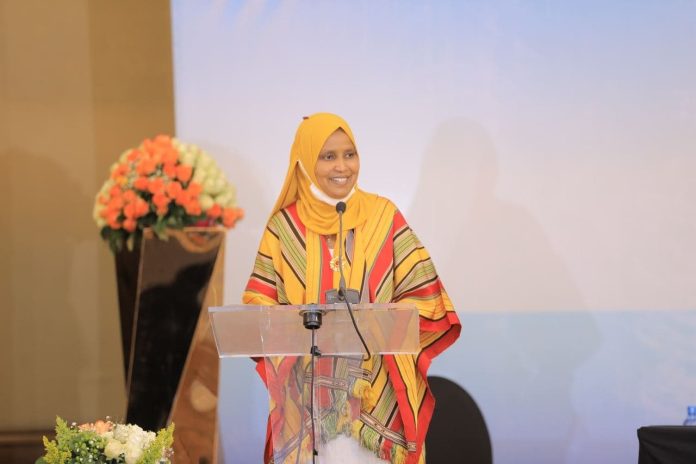Facebook Twitter (X) Instagram Somali Magazine - People's Magazine
Ethiopian Defence Minister Aisha Mohammed Mussa visited Somalia on Thursday, marking a significant step towards restoring relations between the two nations after a year of heightened tensions. This diplomatic meeting signals a potential easing of strained ties following a controversial naval base agreement between Ethiopia and the breakaway Somali region of Somaliland.
Strengthening Bilateral Relations
Somalia’s State Minister for Foreign Affairs, Ali Omar, confirmed the visit, though he did not disclose specific details regarding the topics of discussion. However, Ethiopia’s Ministry of Foreign Affairs stated via the X platform that both countries had agreed to collaborate on the African Union Support and Stabilization Mission (AUSSOM) and work towards strengthening bilateral relations.
This visit is the first of its kind since diplomatic relations soured over Ethiopia’s controversial plan to build a naval base in Somaliland, a breakaway region in northern Somalia that declared autonomy in 1991 but has not been officially recognized as an independent state.
Background of the Dispute
Tensions between Ethiopia and Somalia escalated in early 2024 when Ethiopia signed a preliminary agreement with Somaliland. The deal included leasing a portion of Somaliland’s coastline to Ethiopia for the construction of a naval base and a commercial port. In exchange, Ethiopia offered the possibility of recognizing Somaliland’s independence, a move strongly opposed by Mogadishu.
Somalia views Somaliland as an integral part of its sovereign territory and interpreted Ethiopia’s naval base deal as a direct threat to its national unity and an act of aggression.
A Shift Towards Diplomacy
After months of strained relations and unsuccessful international mediation, diplomatic progress emerged following peace talks in Ankara, Turkey, on December 11, 2024. The talks, brokered by Turkey, saw both sides agree to resolve their dispute through dialogue and technical negotiations scheduled to begin by the end of February 2025.
The latest meeting between Defence Minister Aisha Mohammed Mussa and Somali officials is widely seen as a continuation of these peace efforts, emphasizing regional cooperation and conflict resolution.
Ethiopian Troops in Somalia
Ethiopia maintains a significant military presence in Somalia, with approximately 10,000 troops deployed as part of the African Union peacekeeping mission to combat the extremist group Al-Shabaab. However, Somalia had previously threatened to expel these forces if Ethiopia failed to withdraw from its Somaliland deal.
Ethiopian troops operate under both bilateral agreements and as part of the AUSSOM mission, tasked with supporting Somali security forces against Al-Shabaab insurgents who have waged a deadly insurgency since 2007.
Regional Security Concerns
The Ethiopia-Somalia tensions have raised broader concerns about stability in the Horn of Africa. Security experts have warned that Ethiopia’s potential withdrawal from Somalia could significantly weaken the ongoing fight against Al-Shabaab, which continues to carry out deadly attacks across the region.
Neighboring countries, including Egypt and Eritrea, have also expressed concerns over Ethiopia’s naval ambitions and the possibility of increased instability in the region. Somalia, in turn, has drawn closer to these states as a counterbalance to Ethiopia’s naval base plans.
The Path Forward
While the visit by Ethiopia’s Defence Minister marks a positive step, long-term stability will depend on continued diplomatic efforts and the upcoming technical negotiations. Somalia and Ethiopia’s collaboration on AUSSOM suggests a shared interest in maintaining regional peace and security despite lingering tensions.
Moving forward, international stakeholders, including the African Union (AU) and the United Nations, are expected to closely monitor the progress of negotiations to prevent further conflict in the region.

